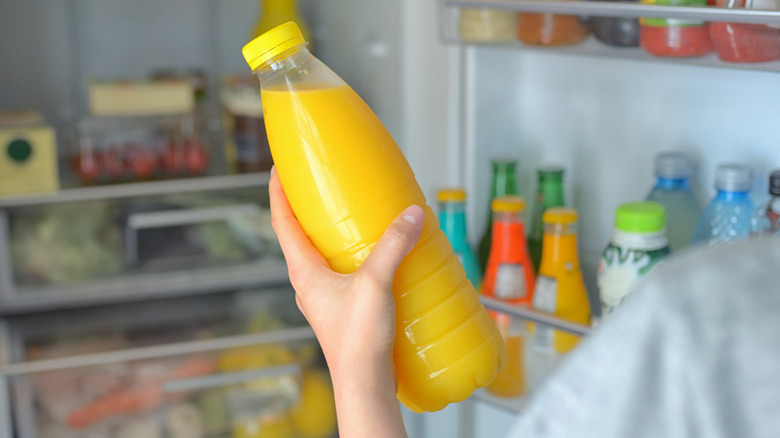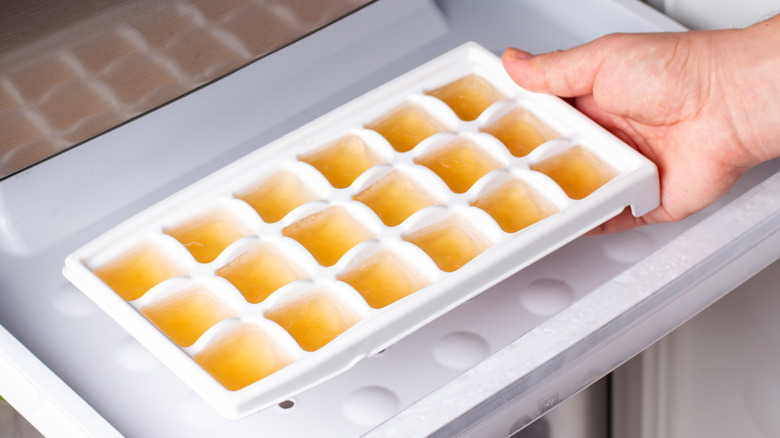How Long An Open Orange Juice Bottle Should Last In The Fridge
Orange juice may be a breakfast table staple, but the vitamin-packed beverage is more than just a sweet morning drink. A splash of orange juice can improve a slab of ribs by adding a little sweet acidity into a marinade. It can add a vibrant punch when mixed into salad dressings or blended into sauces and smoothies. But that carton won't last forever, even when stored in the fridge.
Once you open a carton of orange juice, you'll only have around seven to 10 days to enjoy the rest of the carton. Some brands may have different suggestions, so it is always important to check your carton prior for a "use by" date to opening it. Although some orange juice brands are shelf-stable when sealed, the drink should always be kept in the fridge after opening to prevent bacteria growth. Bottles sold in the refrigerated section should never be left out.
Freshly squeezed orange juice will have a much shorter lifespan. While it may be enticing to make your own preservative-free beverage at home, you'll only have about two to three days to enjoy it before it starts to deteriorate. So while it may taste extra fresh and delicious at first, you may want to only squeeze out enough to enjoy immediately.
How to tell if orange juice is spoiled
Generally, so long as the orange juice is still within that freshness window, it's still safe to sip on. But there are a few signs to look out for to see if it's spoiled. If the carton feels bloated or swelled, it may be best to toss it before mixing it into a screwdriver — even if the cocktail got its name in an unsanitary way. When the juice ages, it builds up carbon dioxide as the bacteria begins to multiply, putting pressure on the container.
The smell of the OJ is also a pretty good indicator that it's past its prime. While orange juice typically has a pretty pungent, acidic smell when it's fresh, any rotten or vinegar-like scents wafting out are a good gauge for knowing that the juice is spoiled. And, of course, if it tastes poorly when you take a sip, it should be poured out.
Visually, orange juice should still be vibrant and brightly colored when it's safe to drink. Any darker or faded hues are signs that it's no longer good. And, of course, if any mold or lumps are present in the liquid, it's absolutely a no-go. Although it may be tempting to hold onto a half-full carton of juice, it's better to err on the side of caution if any spoilage is spotted.
Freeze juice to make it last longer
You can also stock up and freeze store-bought orange juice for up to 10 months, or fresh-squeezed for three to four months. It feels like orange juice concentrate fell off the face of the Earth after demand for the pre-frozen juice cans died down, but it is pretty easy to freeze it. Pre-portioned amounts can be frozen separately, so smaller servings can be defrosted at a time. This can be achieved through using airtight resealable containers. Or, the juice can be poured in an ice cube tray.
To defrost orange juice, just take it out of the freezer and place it in the fridge overnight. The cooler temperatures will allow the juice to defrost and return to liquid while still staying cool. However, this does cut down on the time it can spend in the fridge, as the juice will only be good to drink for three to five days after defrosting. If you need a faster thawing method, the container of frozen juice can be placed in a bowl of warm water. As it rests, the warmer temperatures will defrost it. Just be cautious not to leave the juice out for too long. It can only sit at room temperature for two hours maximum before bacteria growth or fermentation begins. But, once the juice is ready to drink, you can pop out a few frozen juice cubes to cool it off again without any risk of watering it down.



